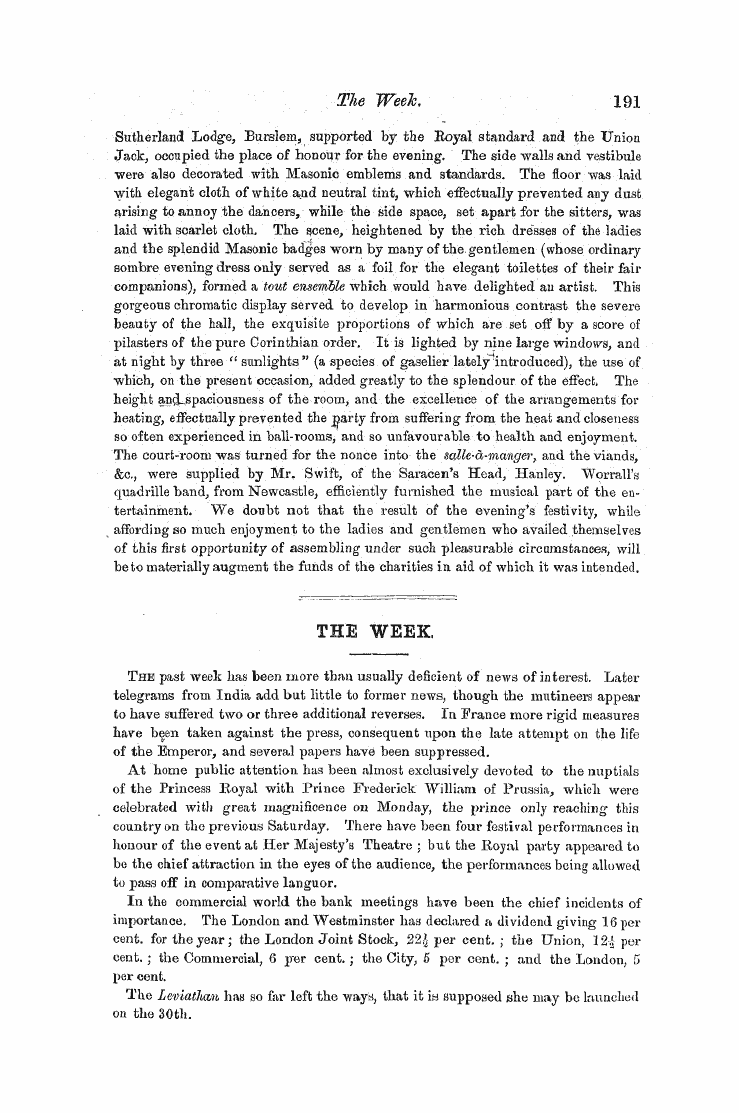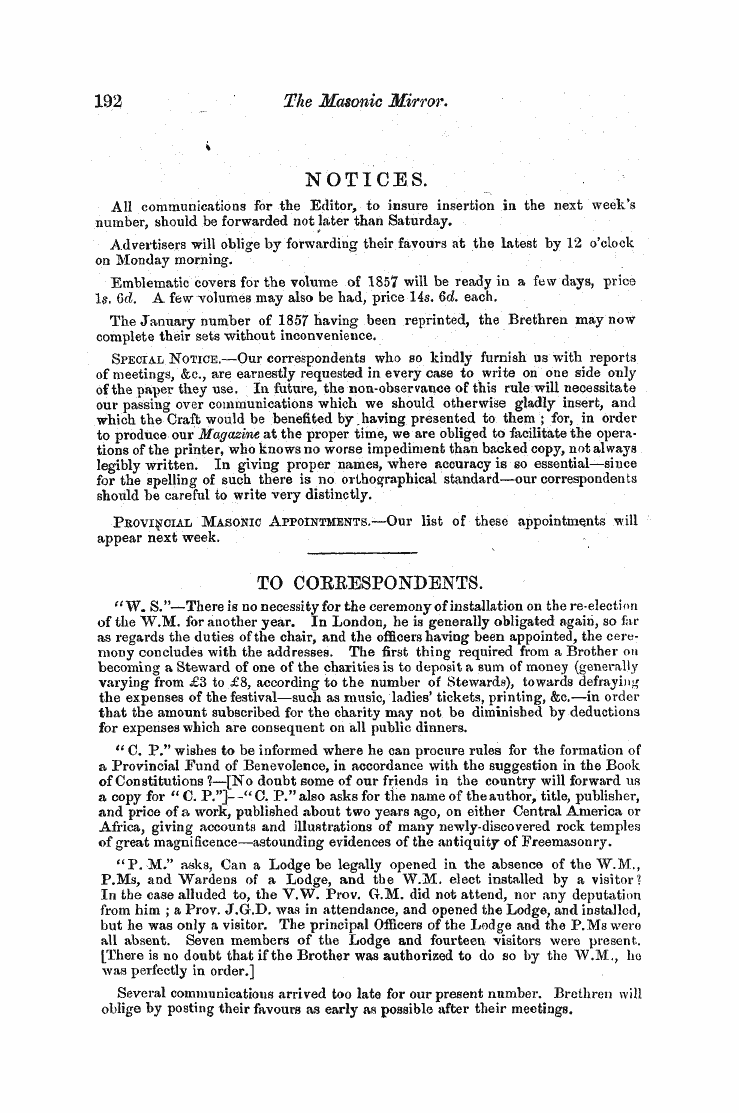-
Articles/Ads
Article THE NINE GEEAT TETJTHS IN MASONED. ← Page 2 of 3 →
Note: This text has been automatically extracted via Optical Character Recognition (OCR) software.
The Nine Geeat Tetjths In Masoned.
forced , but are not under obligation to obey the stronger . God is the principle of Morality , but not by His mere will , which , abstracted from all other of His attributes , would be neither just nor unjust . Good is the expressionof His will , in so far as that will is itself the expression of eternal , absolute , uncreated
justice , which is in God , which His will did not create ; but which it executes and promulgates , as our will proclaims and promulgates , and executes the idea of the good which is in us . He has given us the law of Truth and Justice ; but He has not arbitrarily instituted that law . Justice is inherent in His will , because it is contained in His intelligence and wisdom , in His very nature and most intimate
essence . The Fifth Great Truth in Masonry is this : There is an essential distinction between Good andEvil ; what is just and what is unjust ; and to this distinction is attached , for every intelligent and free creature , the absolute obligation of conforming to what is good and just . Man is an intelligent and free being—free , because he is conscious that it is his duty , and
because it is made his duty , to obey the dictates of truth and justice , and therefore heinust necessarily have the power of doing so , which involves the power of not doing so— -capable of comprehending the distinction between good and evil , justice and injustice , and the obligation which accompanies it , and of naturally adhering to that obligation , independently of any contract or positive law ; capable also of resisting the temptations which urge him towards evil and injustice , and of complying with the sacred law of eternal justice .
That man is not governed by a resistless fate or inexorable destiny , hut is free to choose between the evil and the good : that Justice and Right , the Good and Beautiful , are of the essence of the Divinity , like His Infinitude ; and therefore they are laws to man : that we are conscious of our freedom to act , as we are conscious of our identity , and the continuance and connectedness of our existence ; and have the same evidence of one as of the other ; and if we can put onein doubt , we have no certainty of either and everything is unreal ; that we can deny our free will and free agency , only upon the ground that they are in the nature of things impossible ; which would be to deny the Omnipotence of God .
The Sixth Great Truth in Masonry is this : The necessity of practising the moral truths is , obligation . The moral truths , necessary in the eye of reason , are obligatory on the will . The moral obligation , like the moral truth that is its foundation , is absolute . As the necessary truths are not more or less necessary , so tbe obligation is not more or less obligatory . There are degress of importance among different obligations ; but none in the obligation itself . We are not nearly obliged , almost obliged . We are wholly so , or not at
all . If there be any place of refuge to which we can escape from the obligation , it ceases to exist . If the obligation is absolute , it is immutable and universal . For if that of to-day may not be that of to-morrow—if what is obligatory on me may not be obligatory on you—the obligation would differ from itself and be variable and contingent . This fact is the principle of all morality . That every act contrary to right and justice , deserves to be repressed by force , and punished when committed , equally in the absence of any law or contract : that man naturally
recognizes the distinction between the merit and demerit of actions , as he does that between justice and injustice , honesty and dishonesty ; and feels , without being taught , and in the absence of law or contract , that it is wrong for vice to be rewarded , or go unpunished , and for virtue to be punished , or left unrewarded : and that , the Deity being infinitely just and good , it must follow , as a necessary and inflexible law , that punishment shall bo the result of sin—its inevitable and natural effect and corollary , and not a mere arbitrary vengeance ,,
The Seventh Great Truth in Masonry is this : The immutable law of God requires that , besides respecting the absolute rights of others , and being merely just , we should do good , bo charitable , and obey the dictates of the generous and noble sentiments of the soul . Charity is a law , because our conscience is not satisfied nor at ease if wc have not relieved tho
Note: This text has been automatically extracted via Optical Character Recognition (OCR) software.
The Nine Geeat Tetjths In Masoned.
forced , but are not under obligation to obey the stronger . God is the principle of Morality , but not by His mere will , which , abstracted from all other of His attributes , would be neither just nor unjust . Good is the expressionof His will , in so far as that will is itself the expression of eternal , absolute , uncreated
justice , which is in God , which His will did not create ; but which it executes and promulgates , as our will proclaims and promulgates , and executes the idea of the good which is in us . He has given us the law of Truth and Justice ; but He has not arbitrarily instituted that law . Justice is inherent in His will , because it is contained in His intelligence and wisdom , in His very nature and most intimate
essence . The Fifth Great Truth in Masonry is this : There is an essential distinction between Good andEvil ; what is just and what is unjust ; and to this distinction is attached , for every intelligent and free creature , the absolute obligation of conforming to what is good and just . Man is an intelligent and free being—free , because he is conscious that it is his duty , and
because it is made his duty , to obey the dictates of truth and justice , and therefore heinust necessarily have the power of doing so , which involves the power of not doing so— -capable of comprehending the distinction between good and evil , justice and injustice , and the obligation which accompanies it , and of naturally adhering to that obligation , independently of any contract or positive law ; capable also of resisting the temptations which urge him towards evil and injustice , and of complying with the sacred law of eternal justice .
That man is not governed by a resistless fate or inexorable destiny , hut is free to choose between the evil and the good : that Justice and Right , the Good and Beautiful , are of the essence of the Divinity , like His Infinitude ; and therefore they are laws to man : that we are conscious of our freedom to act , as we are conscious of our identity , and the continuance and connectedness of our existence ; and have the same evidence of one as of the other ; and if we can put onein doubt , we have no certainty of either and everything is unreal ; that we can deny our free will and free agency , only upon the ground that they are in the nature of things impossible ; which would be to deny the Omnipotence of God .
The Sixth Great Truth in Masonry is this : The necessity of practising the moral truths is , obligation . The moral truths , necessary in the eye of reason , are obligatory on the will . The moral obligation , like the moral truth that is its foundation , is absolute . As the necessary truths are not more or less necessary , so tbe obligation is not more or less obligatory . There are degress of importance among different obligations ; but none in the obligation itself . We are not nearly obliged , almost obliged . We are wholly so , or not at
all . If there be any place of refuge to which we can escape from the obligation , it ceases to exist . If the obligation is absolute , it is immutable and universal . For if that of to-day may not be that of to-morrow—if what is obligatory on me may not be obligatory on you—the obligation would differ from itself and be variable and contingent . This fact is the principle of all morality . That every act contrary to right and justice , deserves to be repressed by force , and punished when committed , equally in the absence of any law or contract : that man naturally
recognizes the distinction between the merit and demerit of actions , as he does that between justice and injustice , honesty and dishonesty ; and feels , without being taught , and in the absence of law or contract , that it is wrong for vice to be rewarded , or go unpunished , and for virtue to be punished , or left unrewarded : and that , the Deity being infinitely just and good , it must follow , as a necessary and inflexible law , that punishment shall bo the result of sin—its inevitable and natural effect and corollary , and not a mere arbitrary vengeance ,,
The Seventh Great Truth in Masonry is this : The immutable law of God requires that , besides respecting the absolute rights of others , and being merely just , we should do good , bo charitable , and obey the dictates of the generous and noble sentiments of the soul . Charity is a law , because our conscience is not satisfied nor at ease if wc have not relieved tho
































































































































































































